BMP4002 Business Law: UK Legal System and Contract Law Analysis
VerifiedAdded on 2023/06/08
|7
|1923
|79
Homework Assignment
AI Summary
This assignment delves into the intricacies of the UK Legal System, providing a comprehensive overview of its structure and sources. It begins by defining law within the UK context, then classifies and differentiates between public and private law, and examines the legal systems across England & Wales, Northern Ireland, and Scotland. The assignment further explores the sources of UK law, including legislation, common law, and delegated legislation, providing detailed explanations and examples for each. It also analyzes how organizations are affected by UK law, specifically focusing on contract law, its essential elements, and implications for businesses. The document also briefly touches on the impact of multilingual arrangements within the UK legal framework. References to books and journals are provided at the end of the document.
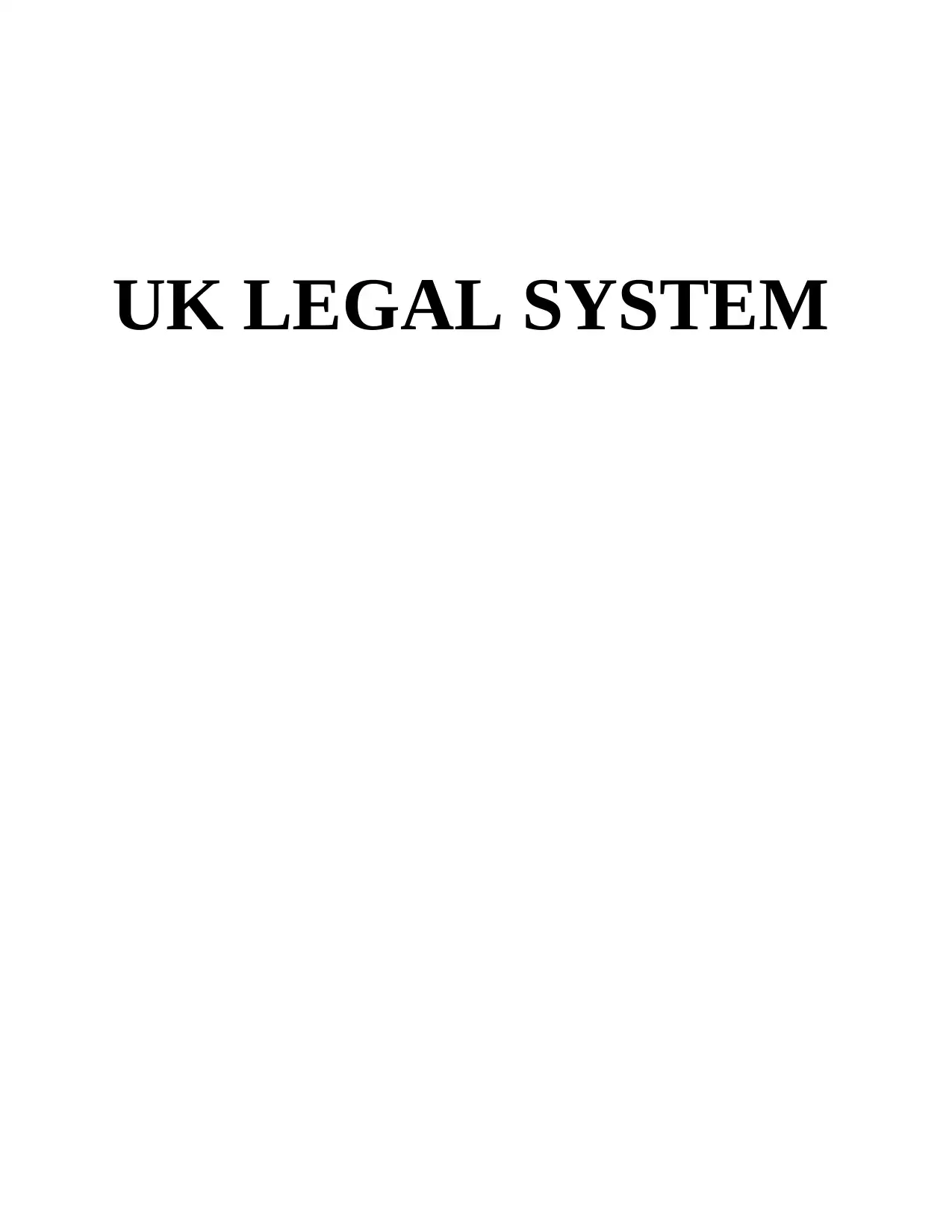
UK LEGAL SYSTEM
Paraphrase This Document
Need a fresh take? Get an instant paraphrase of this document with our AI Paraphraser
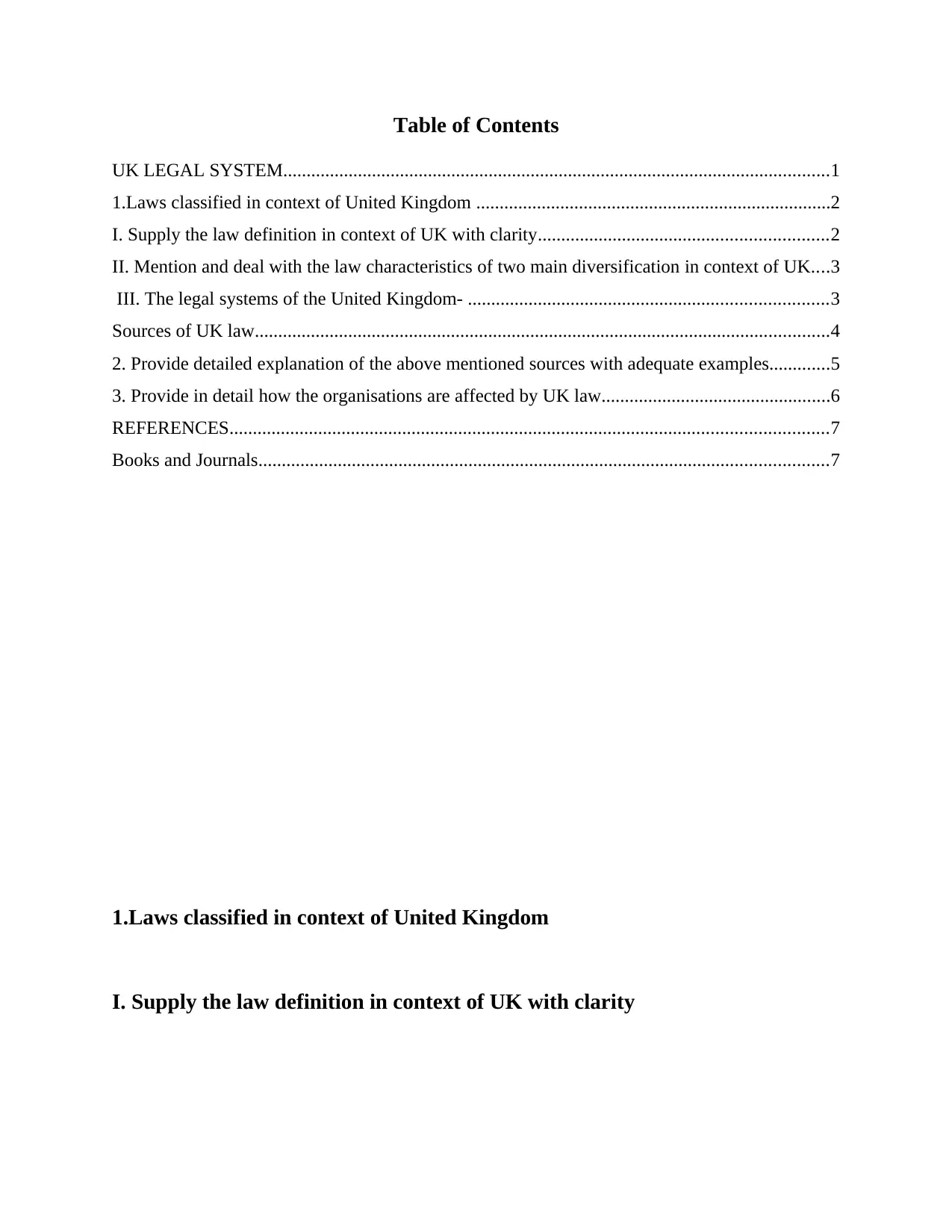
Table of Contents
UK LEGAL SYSTEM.....................................................................................................................1
1.Laws classified in context of United Kingdom ............................................................................2
I. Supply the law definition in context of UK with clarity..............................................................2
II. Mention and deal with the law characteristics of two main diversification in context of UK....3
III. The legal systems of the United Kingdom- .............................................................................3
Sources of UK law...........................................................................................................................4
2. Provide detailed explanation of the above mentioned sources with adequate examples.............5
3. Provide in detail how the organisations are affected by UK law.................................................6
REFERENCES................................................................................................................................7
Books and Journals..........................................................................................................................7
1.Laws classified in context of United Kingdom
I. Supply the law definition in context of UK with clarity
UK LEGAL SYSTEM.....................................................................................................................1
1.Laws classified in context of United Kingdom ............................................................................2
I. Supply the law definition in context of UK with clarity..............................................................2
II. Mention and deal with the law characteristics of two main diversification in context of UK....3
III. The legal systems of the United Kingdom- .............................................................................3
Sources of UK law...........................................................................................................................4
2. Provide detailed explanation of the above mentioned sources with adequate examples.............5
3. Provide in detail how the organisations are affected by UK law.................................................6
REFERENCES................................................................................................................................7
Books and Journals..........................................................................................................................7
1.Laws classified in context of United Kingdom
I. Supply the law definition in context of UK with clarity
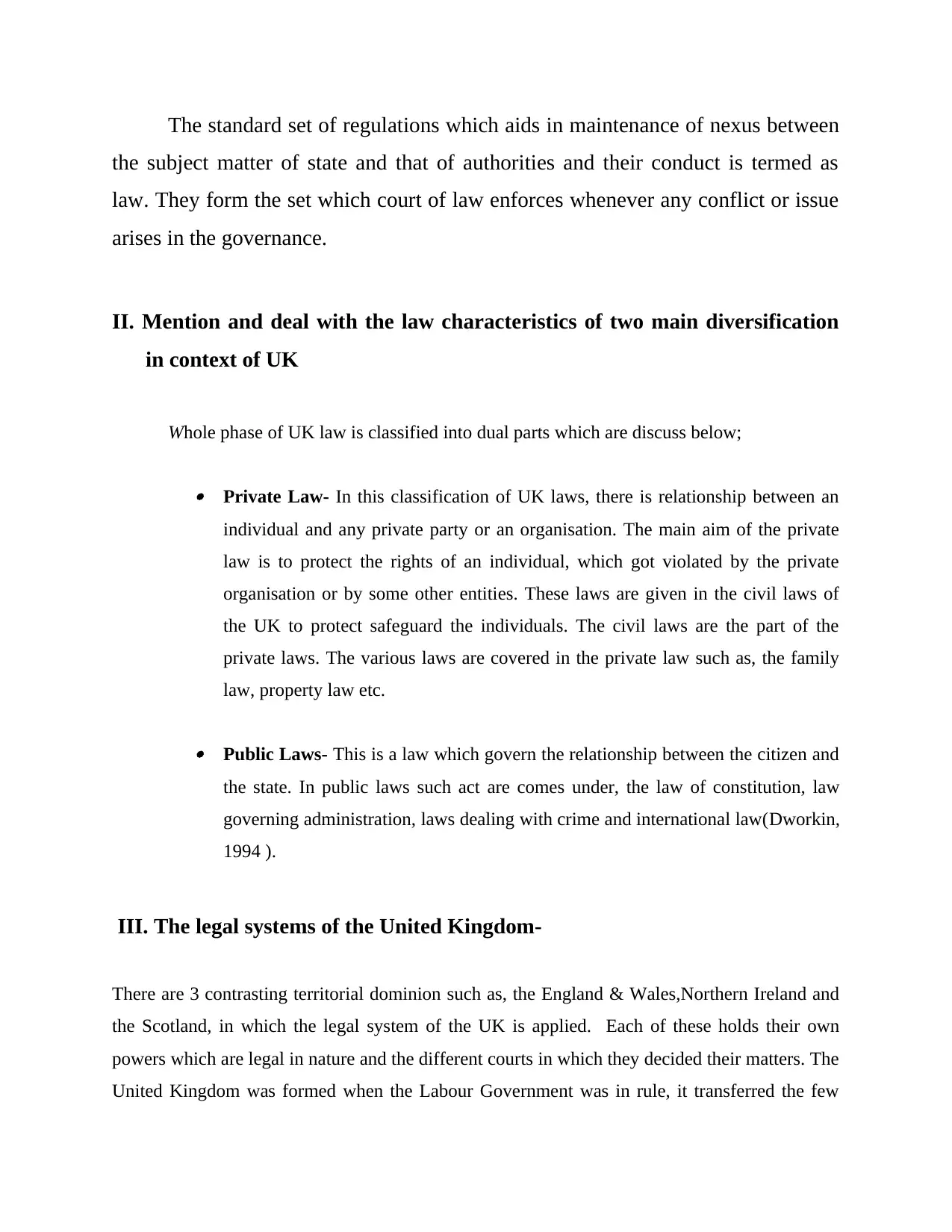
The standard set of regulations which aids in maintenance of nexus between
the subject matter of state and that of authorities and their conduct is termed as
law. They form the set which court of law enforces whenever any conflict or issue
arises in the governance.
II. Mention and deal with the law characteristics of two main diversification
in context of UK
Whole phase of UK law is classified into dual parts which are discuss below;
Private Law- In this classification of UK laws, there is relationship between an
individual and any private party or an organisation. The main aim of the private
law is to protect the rights of an individual, which got violated by the private
organisation or by some other entities. These laws are given in the civil laws of
the UK to protect safeguard the individuals. The civil laws are the part of the
private laws. The various laws are covered in the private law such as, the family
law, property law etc.
Public Laws- This is a law which govern the relationship between the citizen and
the state. In public laws such act are comes under, the law of constitution, law
governing administration, laws dealing with crime and international law(Dworkin,
1994 ).
III. The legal systems of the United Kingdom-
There are 3 contrasting territorial dominion such as, the England & Wales,Northern Ireland and
the Scotland, in which the legal system of the UK is applied. Each of these holds their own
powers which are legal in nature and the different courts in which they decided their matters. The
United Kingdom was formed when the Labour Government was in rule, it transferred the few
the subject matter of state and that of authorities and their conduct is termed as
law. They form the set which court of law enforces whenever any conflict or issue
arises in the governance.
II. Mention and deal with the law characteristics of two main diversification
in context of UK
Whole phase of UK law is classified into dual parts which are discuss below;
Private Law- In this classification of UK laws, there is relationship between an
individual and any private party or an organisation. The main aim of the private
law is to protect the rights of an individual, which got violated by the private
organisation or by some other entities. These laws are given in the civil laws of
the UK to protect safeguard the individuals. The civil laws are the part of the
private laws. The various laws are covered in the private law such as, the family
law, property law etc.
Public Laws- This is a law which govern the relationship between the citizen and
the state. In public laws such act are comes under, the law of constitution, law
governing administration, laws dealing with crime and international law(Dworkin,
1994 ).
III. The legal systems of the United Kingdom-
There are 3 contrasting territorial dominion such as, the England & Wales,Northern Ireland and
the Scotland, in which the legal system of the UK is applied. Each of these holds their own
powers which are legal in nature and the different courts in which they decided their matters. The
United Kingdom was formed when the Labour Government was in rule, it transferred the few
⊘ This is a preview!⊘
Do you want full access?
Subscribe today to unlock all pages.

Trusted by 1+ million students worldwide
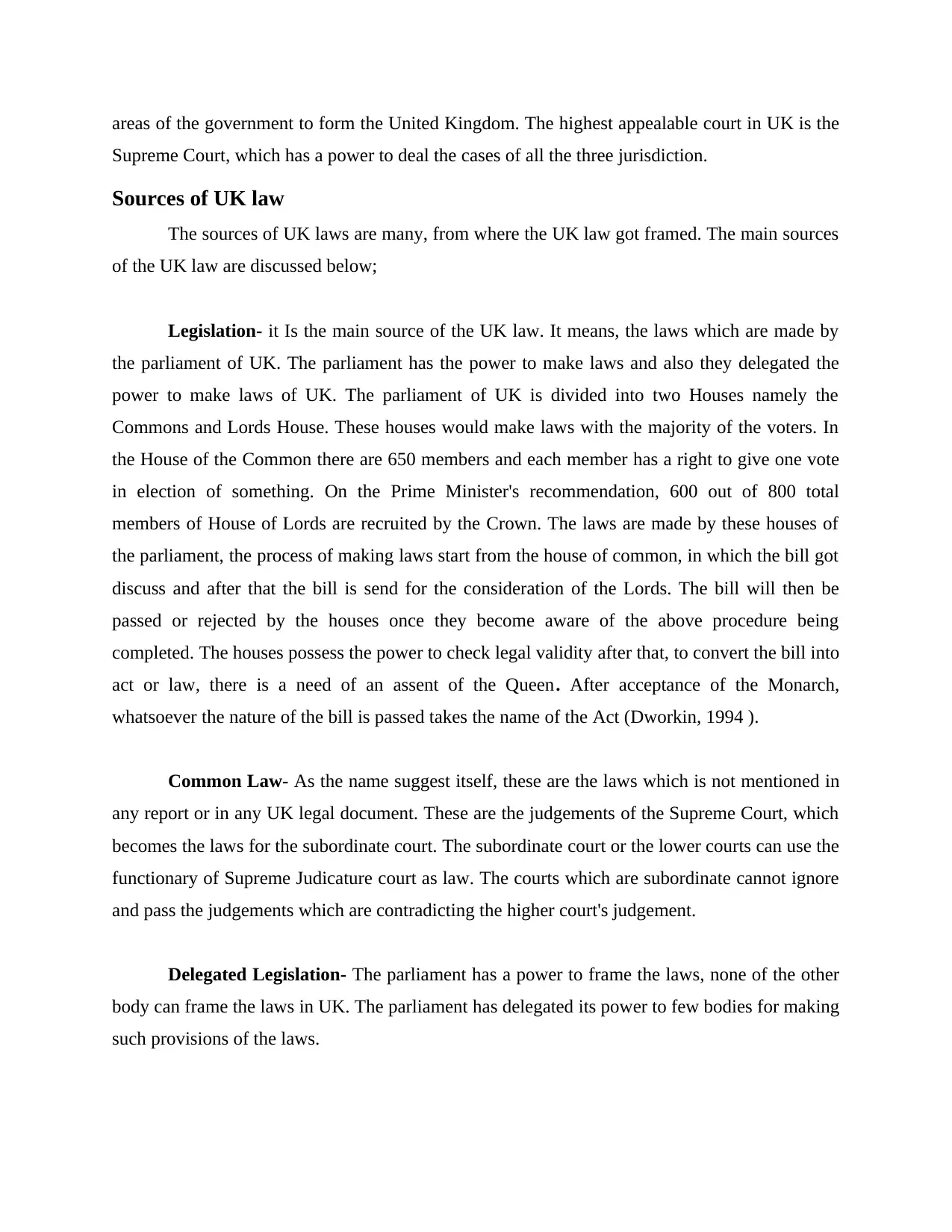
areas of the government to form the United Kingdom. The highest appealable court in UK is the
Supreme Court, which has a power to deal the cases of all the three jurisdiction.
Sources of UK law
The sources of UK laws are many, from where the UK law got framed. The main sources
of the UK law are discussed below;
Legislation- it Is the main source of the UK law. It means, the laws which are made by
the parliament of UK. The parliament has the power to make laws and also they delegated the
power to make laws of UK. The parliament of UK is divided into two Houses namely the
Commons and Lords House. These houses would make laws with the majority of the voters. In
the House of the Common there are 650 members and each member has a right to give one vote
in election of something. On the Prime Minister's recommendation, 600 out of 800 total
members of House of Lords are recruited by the Crown. The laws are made by these houses of
the parliament, the process of making laws start from the house of common, in which the bill got
discuss and after that the bill is send for the consideration of the Lords. The bill will then be
passed or rejected by the houses once they become aware of the above procedure being
completed. The houses possess the power to check legal validity after that, to convert the bill into
act or law, there is a need of an assent of the Queen. After acceptance of the Monarch,
whatsoever the nature of the bill is passed takes the name of the Act (Dworkin, 1994 ).
Common Law- As the name suggest itself, these are the laws which is not mentioned in
any report or in any UK legal document. These are the judgements of the Supreme Court, which
becomes the laws for the subordinate court. The subordinate court or the lower courts can use the
functionary of Supreme Judicature court as law. The courts which are subordinate cannot ignore
and pass the judgements which are contradicting the higher court's judgement.
Delegated Legislation- The parliament has a power to frame the laws, none of the other
body can frame the laws in UK. The parliament has delegated its power to few bodies for making
such provisions of the laws.
Supreme Court, which has a power to deal the cases of all the three jurisdiction.
Sources of UK law
The sources of UK laws are many, from where the UK law got framed. The main sources
of the UK law are discussed below;
Legislation- it Is the main source of the UK law. It means, the laws which are made by
the parliament of UK. The parliament has the power to make laws and also they delegated the
power to make laws of UK. The parliament of UK is divided into two Houses namely the
Commons and Lords House. These houses would make laws with the majority of the voters. In
the House of the Common there are 650 members and each member has a right to give one vote
in election of something. On the Prime Minister's recommendation, 600 out of 800 total
members of House of Lords are recruited by the Crown. The laws are made by these houses of
the parliament, the process of making laws start from the house of common, in which the bill got
discuss and after that the bill is send for the consideration of the Lords. The bill will then be
passed or rejected by the houses once they become aware of the above procedure being
completed. The houses possess the power to check legal validity after that, to convert the bill into
act or law, there is a need of an assent of the Queen. After acceptance of the Monarch,
whatsoever the nature of the bill is passed takes the name of the Act (Dworkin, 1994 ).
Common Law- As the name suggest itself, these are the laws which is not mentioned in
any report or in any UK legal document. These are the judgements of the Supreme Court, which
becomes the laws for the subordinate court. The subordinate court or the lower courts can use the
functionary of Supreme Judicature court as law. The courts which are subordinate cannot ignore
and pass the judgements which are contradicting the higher court's judgement.
Delegated Legislation- The parliament has a power to frame the laws, none of the other
body can frame the laws in UK. The parliament has delegated its power to few bodies for making
such provisions of the laws.
Paraphrase This Document
Need a fresh take? Get an instant paraphrase of this document with our AI Paraphraser
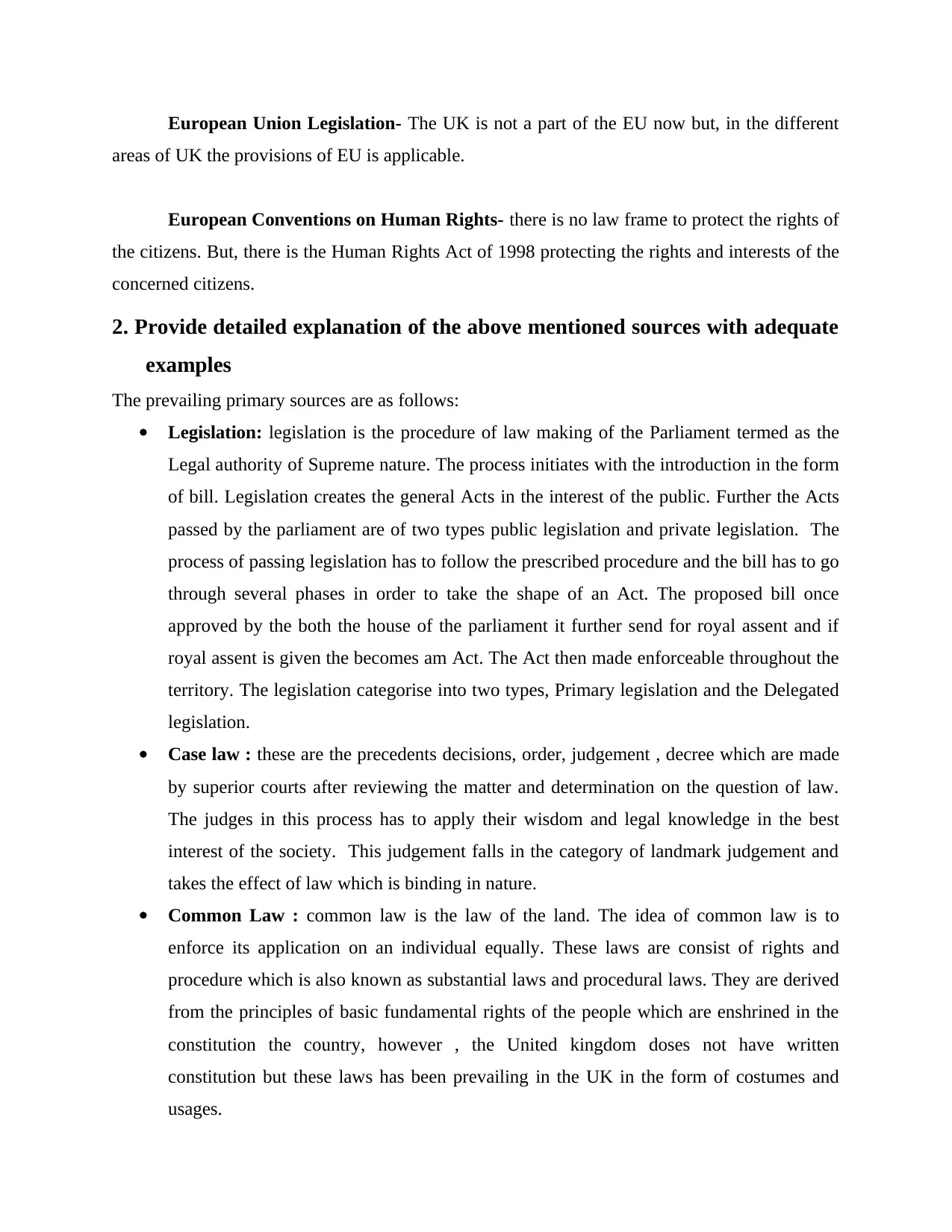
European Union Legislation- The UK is not a part of the EU now but, in the different
areas of UK the provisions of EU is applicable.
European Conventions on Human Rights- there is no law frame to protect the rights of
the citizens. But, there is the Human Rights Act of 1998 protecting the rights and interests of the
concerned citizens.
2. Provide detailed explanation of the above mentioned sources with adequate
examples
The prevailing primary sources are as follows:
Legislation: legislation is the procedure of law making of the Parliament termed as the
Legal authority of Supreme nature. The process initiates with the introduction in the form
of bill. Legislation creates the general Acts in the interest of the public. Further the Acts
passed by the parliament are of two types public legislation and private legislation. The
process of passing legislation has to follow the prescribed procedure and the bill has to go
through several phases in order to take the shape of an Act. The proposed bill once
approved by the both the house of the parliament it further send for royal assent and if
royal assent is given the becomes am Act. The Act then made enforceable throughout the
territory. The legislation categorise into two types, Primary legislation and the Delegated
legislation.
Case law : these are the precedents decisions, order, judgement , decree which are made
by superior courts after reviewing the matter and determination on the question of law.
The judges in this process has to apply their wisdom and legal knowledge in the best
interest of the society. This judgement falls in the category of landmark judgement and
takes the effect of law which is binding in nature.
Common Law : common law is the law of the land. The idea of common law is to
enforce its application on an individual equally. These laws are consist of rights and
procedure which is also known as substantial laws and procedural laws. They are derived
from the principles of basic fundamental rights of the people which are enshrined in the
constitution the country, however , the United kingdom doses not have written
constitution but these laws has been prevailing in the UK in the form of costumes and
usages.
areas of UK the provisions of EU is applicable.
European Conventions on Human Rights- there is no law frame to protect the rights of
the citizens. But, there is the Human Rights Act of 1998 protecting the rights and interests of the
concerned citizens.
2. Provide detailed explanation of the above mentioned sources with adequate
examples
The prevailing primary sources are as follows:
Legislation: legislation is the procedure of law making of the Parliament termed as the
Legal authority of Supreme nature. The process initiates with the introduction in the form
of bill. Legislation creates the general Acts in the interest of the public. Further the Acts
passed by the parliament are of two types public legislation and private legislation. The
process of passing legislation has to follow the prescribed procedure and the bill has to go
through several phases in order to take the shape of an Act. The proposed bill once
approved by the both the house of the parliament it further send for royal assent and if
royal assent is given the becomes am Act. The Act then made enforceable throughout the
territory. The legislation categorise into two types, Primary legislation and the Delegated
legislation.
Case law : these are the precedents decisions, order, judgement , decree which are made
by superior courts after reviewing the matter and determination on the question of law.
The judges in this process has to apply their wisdom and legal knowledge in the best
interest of the society. This judgement falls in the category of landmark judgement and
takes the effect of law which is binding in nature.
Common Law : common law is the law of the land. The idea of common law is to
enforce its application on an individual equally. These laws are consist of rights and
procedure which is also known as substantial laws and procedural laws. They are derived
from the principles of basic fundamental rights of the people which are enshrined in the
constitution the country, however , the United kingdom doses not have written
constitution but these laws has been prevailing in the UK in the form of costumes and
usages.
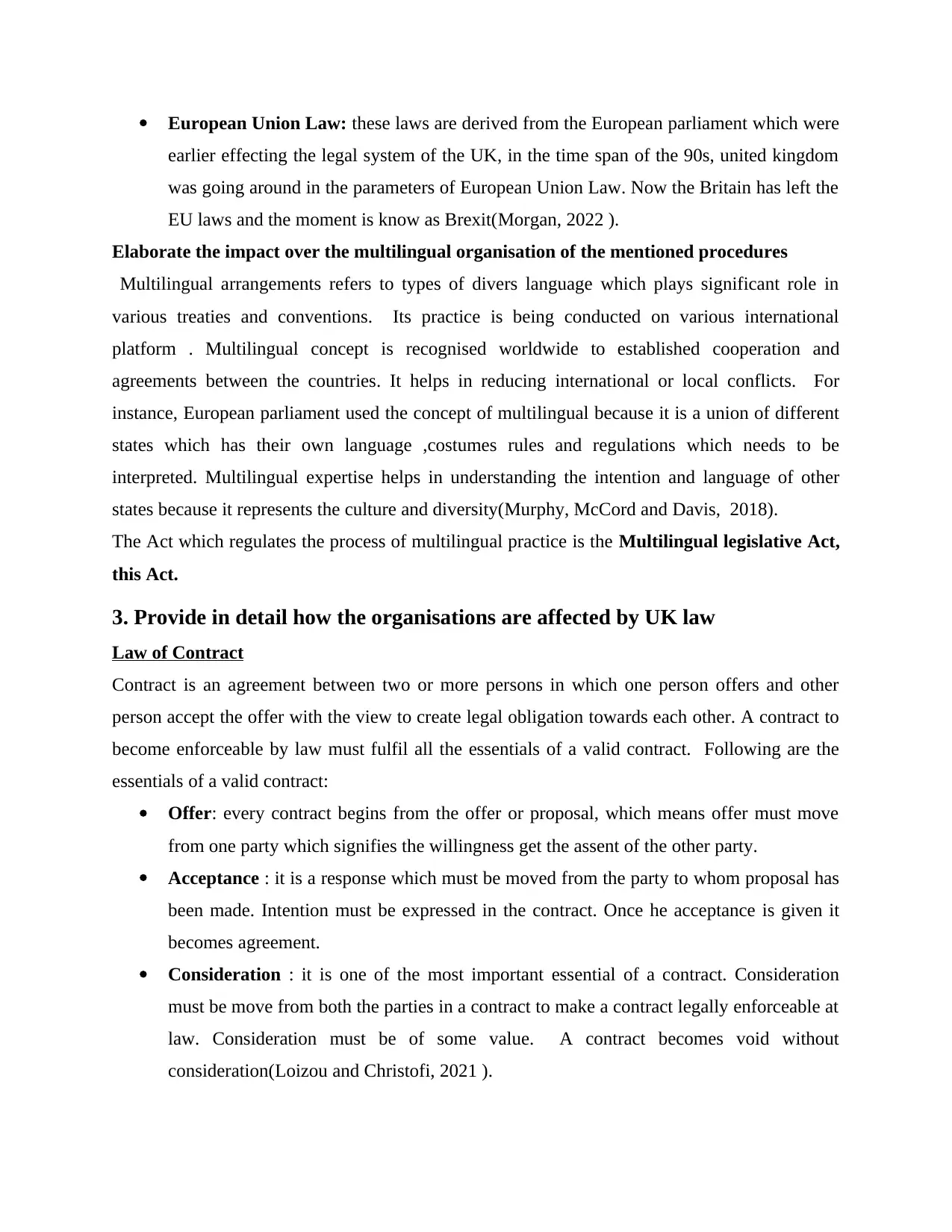
European Union Law: these laws are derived from the European parliament which were
earlier effecting the legal system of the UK, in the time span of the 90s, united kingdom
was going around in the parameters of European Union Law. Now the Britain has left the
EU laws and the moment is know as Brexit(Morgan, 2022 ).
Elaborate the impact over the multilingual organisation of the mentioned procedures
Multilingual arrangements refers to types of divers language which plays significant role in
various treaties and conventions. Its practice is being conducted on various international
platform . Multilingual concept is recognised worldwide to established cooperation and
agreements between the countries. It helps in reducing international or local conflicts. For
instance, European parliament used the concept of multilingual because it is a union of different
states which has their own language ,costumes rules and regulations which needs to be
interpreted. Multilingual expertise helps in understanding the intention and language of other
states because it represents the culture and diversity(Murphy, McCord and Davis, 2018).
The Act which regulates the process of multilingual practice is the Multilingual legislative Act,
this Act.
3. Provide in detail how the organisations are affected by UK law
Law of Contract
Contract is an agreement between two or more persons in which one person offers and other
person accept the offer with the view to create legal obligation towards each other. A contract to
become enforceable by law must fulfil all the essentials of a valid contract. Following are the
essentials of a valid contract:
Offer: every contract begins from the offer or proposal, which means offer must move
from one party which signifies the willingness get the assent of the other party.
Acceptance : it is a response which must be moved from the party to whom proposal has
been made. Intention must be expressed in the contract. Once he acceptance is given it
becomes agreement.
Consideration : it is one of the most important essential of a contract. Consideration
must be move from both the parties in a contract to make a contract legally enforceable at
law. Consideration must be of some value. A contract becomes void without
consideration(Loizou and Christofi, 2021 ).
earlier effecting the legal system of the UK, in the time span of the 90s, united kingdom
was going around in the parameters of European Union Law. Now the Britain has left the
EU laws and the moment is know as Brexit(Morgan, 2022 ).
Elaborate the impact over the multilingual organisation of the mentioned procedures
Multilingual arrangements refers to types of divers language which plays significant role in
various treaties and conventions. Its practice is being conducted on various international
platform . Multilingual concept is recognised worldwide to established cooperation and
agreements between the countries. It helps in reducing international or local conflicts. For
instance, European parliament used the concept of multilingual because it is a union of different
states which has their own language ,costumes rules and regulations which needs to be
interpreted. Multilingual expertise helps in understanding the intention and language of other
states because it represents the culture and diversity(Murphy, McCord and Davis, 2018).
The Act which regulates the process of multilingual practice is the Multilingual legislative Act,
this Act.
3. Provide in detail how the organisations are affected by UK law
Law of Contract
Contract is an agreement between two or more persons in which one person offers and other
person accept the offer with the view to create legal obligation towards each other. A contract to
become enforceable by law must fulfil all the essentials of a valid contract. Following are the
essentials of a valid contract:
Offer: every contract begins from the offer or proposal, which means offer must move
from one party which signifies the willingness get the assent of the other party.
Acceptance : it is a response which must be moved from the party to whom proposal has
been made. Intention must be expressed in the contract. Once he acceptance is given it
becomes agreement.
Consideration : it is one of the most important essential of a contract. Consideration
must be move from both the parties in a contract to make a contract legally enforceable at
law. Consideration must be of some value. A contract becomes void without
consideration(Loizou and Christofi, 2021 ).
⊘ This is a preview!⊘
Do you want full access?
Subscribe today to unlock all pages.

Trusted by 1+ million students worldwide
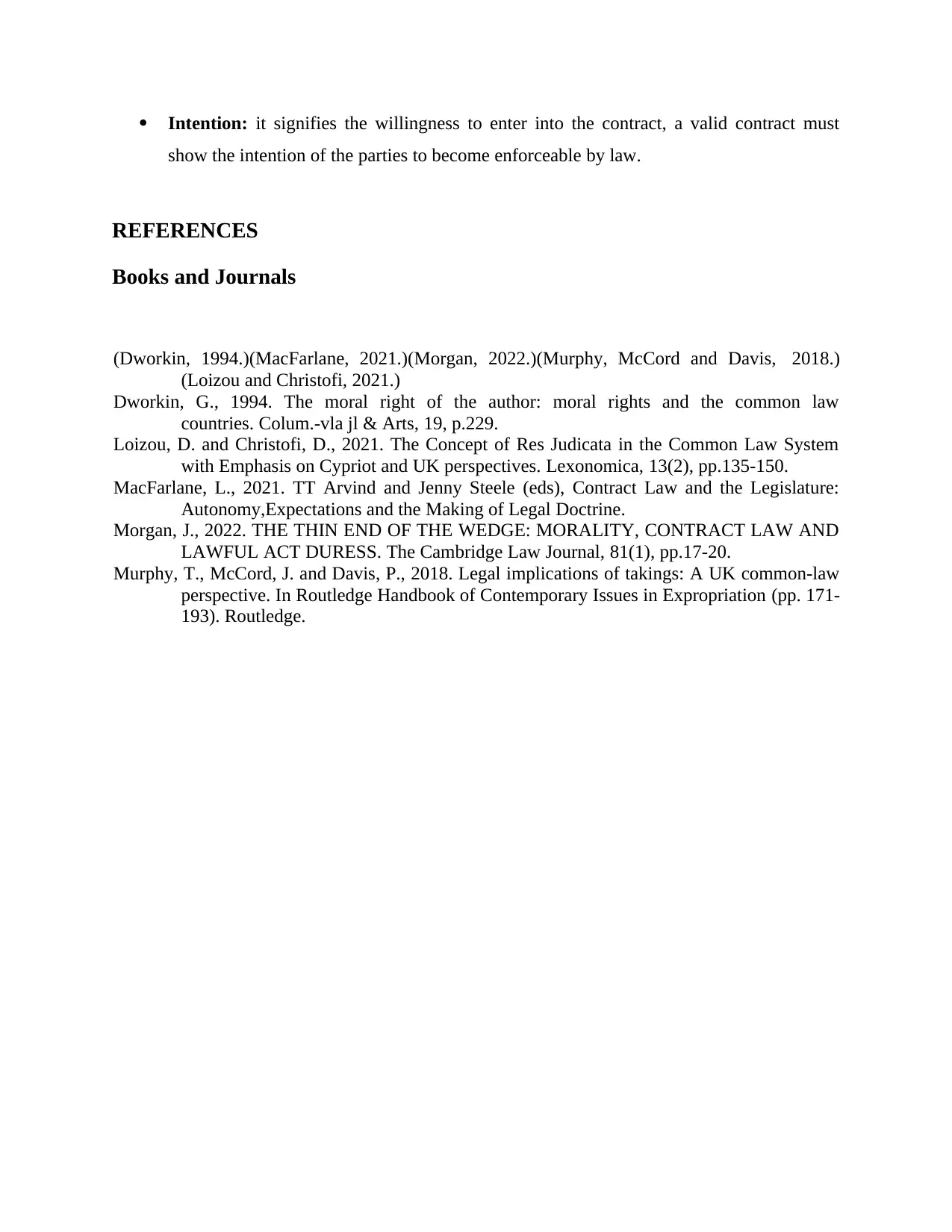
Intention: it signifies the willingness to enter into the contract, a valid contract must
show the intention of the parties to become enforceable by law.
REFERENCES
Books and Journals
(Dworkin, 1994.)(MacFarlane, 2021.)(Morgan, 2022.)(Murphy, McCord and Davis, 2018.)
(Loizou and Christofi, 2021.)
Dworkin, G., 1994. The moral right of the author: moral rights and the common law
countries. Colum.-vla jl & Arts, 19, p.229.
Loizou, D. and Christofi, D., 2021. The Concept of Res Judicata in the Common Law System
with Emphasis on Cypriot and UK perspectives. Lexonomica, 13(2), pp.135-150.
MacFarlane, L., 2021. TT Arvind and Jenny Steele (eds), Contract Law and the Legislature:
Autonomy,Expectations and the Making of Legal Doctrine.
Morgan, J., 2022. THE THIN END OF THE WEDGE: MORALITY, CONTRACT LAW AND
LAWFUL ACT DURESS. The Cambridge Law Journal, 81(1), pp.17-20.
Murphy, T., McCord, J. and Davis, P., 2018. Legal implications of takings: A UK common-law
perspective. In Routledge Handbook of Contemporary Issues in Expropriation (pp. 171-
193). Routledge.
show the intention of the parties to become enforceable by law.
REFERENCES
Books and Journals
(Dworkin, 1994.)(MacFarlane, 2021.)(Morgan, 2022.)(Murphy, McCord and Davis, 2018.)
(Loizou and Christofi, 2021.)
Dworkin, G., 1994. The moral right of the author: moral rights and the common law
countries. Colum.-vla jl & Arts, 19, p.229.
Loizou, D. and Christofi, D., 2021. The Concept of Res Judicata in the Common Law System
with Emphasis on Cypriot and UK perspectives. Lexonomica, 13(2), pp.135-150.
MacFarlane, L., 2021. TT Arvind and Jenny Steele (eds), Contract Law and the Legislature:
Autonomy,Expectations and the Making of Legal Doctrine.
Morgan, J., 2022. THE THIN END OF THE WEDGE: MORALITY, CONTRACT LAW AND
LAWFUL ACT DURESS. The Cambridge Law Journal, 81(1), pp.17-20.
Murphy, T., McCord, J. and Davis, P., 2018. Legal implications of takings: A UK common-law
perspective. In Routledge Handbook of Contemporary Issues in Expropriation (pp. 171-
193). Routledge.
1 out of 7
Related Documents
Your All-in-One AI-Powered Toolkit for Academic Success.
+13062052269
info@desklib.com
Available 24*7 on WhatsApp / Email
![[object Object]](/_next/static/media/star-bottom.7253800d.svg)
Unlock your academic potential
Copyright © 2020–2026 A2Z Services. All Rights Reserved. Developed and managed by ZUCOL.



